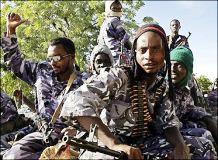Sudan says Darfur deal does not preclude right of self-defence
KHARTOUM, Nov 11 (AFP) — The Sudanese government’s chief negotiator insisted that a new African Union-brokered security deal for the war-torn western region of Darfur did not ban military flights or preclude the right of self-defence.

|
|
Sudanese national policemen leave the Governor compound in Nyala, South Darfur, Sudan, Thursday Nov 11, 2004 (AFP). |
Agriculture Minister Majzoub al-Khalifa Ahmed said proposals for a “no-fly zone” over the region like those enforced over northern and southern Iraq under Saddam Hussein’s regime had been dropped from the final agreement inked in the Nigerian capital Tuesday.
“What was mentioned was cessation by all parties of military operations on land and by air, and of any act that may jeopardize the ceasefire,” Ahmed told reporters on his return from the talks in Abuja.
“Our brothers in the (rebel) movements demanded cessation of military flights and civil flights for military purposes and we told them that this was unacceptable to a sovereign state.
“Then they demanded a ban on military flights only and again we told them that this was also unacceptable.”
Ahmed said his delegation had merely undertaken to refrain from starting an offensive by land or air on condition that the rebels ceased fire.
He said the right of self-defence for government forces had been set out in “a written explanation” from African Union mediators.
The “no-fly zone” debate had held up agreement of the security deal and a parallel humanitarian accord for several days.
The government’s use of warplanes to bomb ethnic minority villages suspected of supporting the rebels was one of a string of alleged abuses cited by Washington to support its charges of genocide against the Khartoum regime.
On the ground, UN envoy Jan Pronk and Foreign Minister Mustapha Osman Ismail jointly visited a camp for displaced people in Darfur, the state news agency SUNA reported.
It said that residents of Serif camp in South Darfur State who had recently been moved from Al-Geer, another camp, told the envoy during Wednesday’s visit that they had been relocated voluntarily.
In Geneva, a United Nations human rights expert called on the Khartoum government to immediately halt forced relocations of displaced people in the strife-torn Darfur region of western Sudan.
Walter Kaelin, the UN chief’s representative for the rights of internally displaced people, emphasized that Khartoum was responsible for stopping attacks, even if they were carried out by militia.
“It is the government of Sudan that bears the primary responsibility to ensure the protection of its own people,” Kaelin said in a statement calling on Khartoum “to immediately halt forced relocations and other serious violations”.
Kaelin voiced “grave concern” at reports of Sudanese police storming the Al-Geer camp and a village in northern Darfur to move people, beating civilians and using tear-gas to force them out or onto trucks.
SUNA reported that Hussein Ibrahim Kershoum, a humanitarian aid commissioner for South Darfur, told Pronk that Al-Geer had been set up on private land near Nyala city and close to camps of the security forces.
Serif is now being used to house 534 displaced persons.
